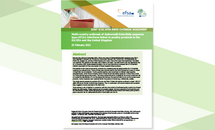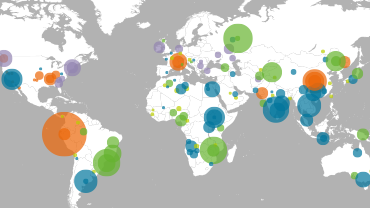Multi-country outbreak of Salmonella Enteritidis sequence type (ST)11 infections linked to poultry products in the EU/EEA and the United Kingdom
Between May 2018 and December 2020, 193 human cases of Salmonella Enteritidis sequence type (ST)11 were reported in Denmark (2), Finland (4), France (33), Germany (6), Ireland (12), the Netherlands (3), Poland (5), Sweden (6), and the United Kingdom (UK) (122). One in five cases was hospitalised. One death was reported. Fifty percent of the cases were children ≤ 18 years. The most recent case was reported by the UK in December 2020.
Executive summary
Epidemiological studies in the UK have identified an increased risk of S. Enteritidis infection associated with the consumption of frozen breaded chicken products.
Five batches of non-ready-to-eat poultry products (e.g. breaded products) tested positive for S. Enteritidis matching the outbreak strain. Three of these were manufactured by the Polish Processing Company B where S. Enteritidis was not detected. The five positive batches were traced back to different meat suppliers, slaughterhouses, and/or farms in Poland. Some of these farms had positive results for S. Enteritidis in 2020 (no whole genome sequencing typing). The scarce typing information available for the primary production did not enable the identification of a microbiological link between the positive Polish farms and the contaminated products. Control measures were implemented for the products involved (e.g. withdrawals, recalls).
The whole genome sequencing analysis of human and food S. Enteritidis isolates confirmed a cluster with 0-3 allelic differences through single linkage clustering. This, in combination with epidemiological and traceability data, suggests common source(s) in the food chain.
There remains a risk of infection in connection with the consumption of implicated poultry products purchased before the withdrawals, if these products are not properly cooked. Unknown source(s) of contamination and the identification of other Salmonella serotypes and S. Enteritidis strains indicate that these poultry products pose a recurrent risk for Salmonella infections in the EU/EEA and the UK.






